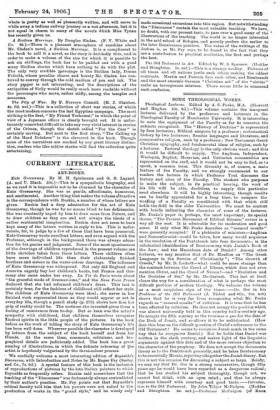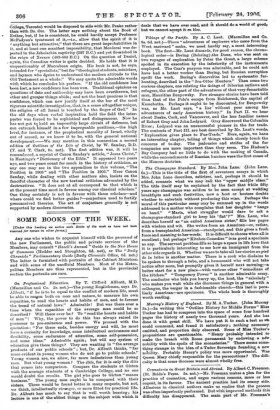SOME THEOLOGICAL WORKS.
Theological Lectures. Edited by A. S. Peake, M.A. (Sherratt and Hughes. 10s. 6d.)—This volume contains the inaugural lectures delivered by the professors and lecturers in the Theological Faculty of Manchester University. It is interesting to note the equipment of the Faculty as far is concerns the subjects recognised. The "History of Doctrine" is represented by four lecturers ; Biblical exegesis by a professor; ecclesiastical history by two lecturers ; Semitic languages and literature, and comparative religion, each by a professor; New Testament Greek Christian epigraphy, and fundamental ideas of religion, each by a lecturer. Pastoral theology is the only obvious want ; and this it would be difficult to supply. Tho Anglican, Independent, Wesleyan, Baptist, Moravian, and Unitarian communities are represented on the staff, and it would not be easy to find, so to speak, a common term. This diversity is, of course, a main feature of the Faculty, and we strongly recommend to our readers the lecture in which Professor Tout discusses the history and aims of the Faculty. The student who purposes to make the subject, in its practical bearing, the work of his life will be able, doubtless, to supply this particular need elsewhere. It will be highly interesting, though results can be hardly appreciated for a long time, to compare the wolfing of a Faculty so constituted with that which still holds the field in the older Universities. We must be content with briefly indicating the character of some of the lectures. Mr. Peake's paper is, perhaps, the most important ; its special theme, "The Present Movement of Biblical Science," covers in a way all the rest. It is admirable for its moderation and good sense. If only what Mr. Peake describes as "assured results" were generally accepted ! If a plebiscite of ministers—Anglican and Nonconformist—could be taken, how many would acquiesce in the resolution of the Pentateuch into four documents ; in the substantial identification of Deuteronomy with Josiah's Book of the Law ; and the Maecabean date of Daniel ? Among other lectures, we may mention that of Dr. Moulton on "The Greek Language in the Service of Christianity "; "The Growth of Creeds," by Mr. D. Lockett—what could be more strange than the contrast between the Creed of Edessa, which does not even mention Christ, and the Creed of Nicaea ?—and "Evolution and the Doctrine of Sin," by Mr. Mackintosh. This last at least clears the way for a consideration of what is perhaps the most difficult problem of modern theology. We welcome the volume as a most auspicious sign of the tinies.—Dr. Orr in his Problems of the Old Tcstament (J. Nisbet and 'Co., 10s. net) shows that he is very far from recognising what Mr. Peake regards as "assured results" of criticism. It is true that he has been affected by criticism. He does not occupy the position which was almost universally held in this country half-a-century ago. He accepts the fifth century as the terminus a quo for the date of the Book of Jonah, and so allows it to be unhistorical. (How does this bear on the difficult question of Christ's references to the Old Testament ? He seems to recognise Jonah much in the same way that he recognises Daniel.) But he holds that Daniel was written in the sixth century, and makes light of the linguistic arguments against this date and of the more serious objection to the character of the prophecy. He does not accept the documents theory as to the Pentateuch generally, and he takes Deuteronomy to be essentially Mosaic, rejecting altogether the Josiah theory. But this is not the occasion for discussing a subject so large. Briefly, we may say that Dr. Orr is a strong conservative, though fifty years ago he would have been regarded as a dangerous radical; that he has studied his subject thoroughly, though not, we cannot but think, with an open mind ; and that he always expresses himself with courtesy and good taste.—/ntroduc. lion to the Old Testament. By John 'Edgar McFadyen. (Hodder and Stoughton. Gs. net.)—Professor McFadyen (of Knox
Esther, but, if he is consistent, he could hardly accept Professor McFadyen's treatment of it,—i.e., allow that the spirit If it is .` anything but attractive," that there are great improbabilities in it, and at least one manifest impossibility, that Mordecai was de- ported in the Jehoiachin captivity (597 B.C.) and yet flourished in the reign of Xerxes (483-460 B.C.) On the question of Daniel, , again, the Canadian writer is quite decided. He holds that it is unquestionably of Maccabean origin. His book is not, he says, intended for "specialists," but for "theological students, ministers, and laymen who drsire to understand the modern attitude to the Old Testament as a whole." We may quote the admirable words with which he concludes his preface. "If the old confidence has been lost, a new confidence has been won. Traditional opinions on questions of date and authorship may have been overthrown, but other and greater things abide; and not the least precious is that confidence, which can now justify itself at the bar of the most rigorous scientific investigation, that, in a sense altogether unique, the religion of all Israel is touched by the finger of God." In the old days when verbal inspiration held the field the inter- preter was forced to be sophistical and disingenuous. Now he has not got th hold an impossibly large circuit of defences, but can entrench himself in a few impregnable positions,—the high level, for instance, of the prophetical morality of Israel, wholly out of accord, as we know it to be, with the general national development.—We may mention in this connection a second edition of Outlines of the Life of Christ, by W. Sanday, D.D. (T. and T. Clark, 6s. net). The first edition was, it will be remembered, a reprint of Canon Sanday's article, "Jesus Christ," in Hastings's "Dictionary of the Bible." It appeared two years ago, and two years count for much in the history of criticism, as any one may see in the two appendices to this volume, "The Position in 1903" and "The Position in 1905." Here Canon Sanday, while dealing with other matters also, insists on the fanciful character of the new textual criticism advocated by the destructives. "It does not at all correspond to that which is at the present time most in favour among our classical scholars." One thing certainly is not in favour with these scholars—and where could we find better guides ?—conjecture used to fortify preconceived theories. The art of conjecture generally is not supported by modern discoveries.











































 Previous page
Previous page